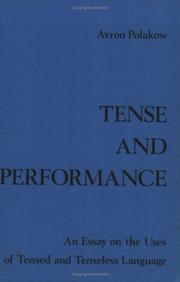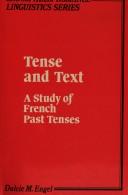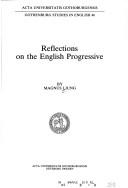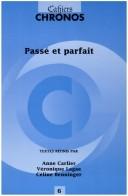| Listing 1 - 10 of 628 | << page >> |
Sort by
|

ISBN: 9062035337 9004455221 Year: 1981 Publisher: Amsterdam Rodopi
Abstract | Keywords | Export | Availability | Bookmark
 Loading...
Loading...Choose an application
- Reference Manager
- EndNote
- RefWorks (Direct export to RefWorks)

ISBN: 0415026466 9780415026468 Year: 1990 Volume: vol *4 Publisher: London: Routledge,
Abstract | Keywords | Export | Availability | Bookmark
 Loading...
Loading...Choose an application
- Reference Manager
- EndNote
- RefWorks (Direct export to RefWorks)
-Tense --- French language --- Grammar --- Tense --- Tense. --- Verb --- French language - Tense. --- French language - Tense
Book
ISBN: 3860647601 9783860647608 Year: 1998 Volume: 27 Publisher: Hamburg: Kovač,
Abstract | Keywords | Export | Availability | Bookmark
 Loading...
Loading...Choose an application
- Reference Manager
- EndNote
- RefWorks (Direct export to RefWorks)
Book
ISBN: 2801112542 9782801112540 Year: 2000 Volume: 40 Publisher: Bruxelles: De Boeck et Larcier,
Abstract | Keywords | Export | Availability | Bookmark
 Loading...
Loading...Choose an application
- Reference Manager
- EndNote
- RefWorks (Direct export to RefWorks)
Book
Year: 1914 Publisher: Berlin : Mayer und Müller,
Abstract | Keywords | Export | Availability | Bookmark
 Loading...
Loading...Choose an application
- Reference Manager
- EndNote
- RefWorks (Direct export to RefWorks)
German language --- Middle High German --- Tense. --- Tense
Book
ISBN: 9789004455221 9789062035335 Year: 1981 Publisher: Leiden;Boston BRILL
Abstract | Keywords | Export | Availability | Bookmark
 Loading...
Loading...Choose an application
- Reference Manager
- EndNote
- RefWorks (Direct export to RefWorks)
Philosophy of language --- Tense --- Time --- Tense (Logic)
Book
ISBN: 9789027257444 Year: 2022 Publisher: Amsterdam, Netherlands : John Benjamins Publishing Company
Abstract | Keywords | Export | Availability | Bookmark
 Loading...
Loading...Choose an application
- Reference Manager
- EndNote
- RefWorks (Direct export to RefWorks)
"Linguistic construal of time lies at the center of language and language use; it is also one of the cognitive foundations of culture. The focus of the papers in this volume is on historical developments of genetically different aspect and tense systems across continents, with contributions on the Sogeram languages of Papua New Guinea, the Arandic languages of Australia, Kisikongo Bantu, and Japanese. In addition, two prototypical Indo-European tense-aspect systems, those of Vedic and Latin, are analyzed in a comparative perspective. Across language groups and continents, the general principles revealed by the studies presented here contribute towards a novel and deepening understanding of tense and aspect. They contribute not only to modelling and theory, but also to a better understanding of processes in individual languages. Originally published as special issue of the Journal of Historical Linguistics 10:2 (2020)"--

ISBN: 917346080X 9789173460804 Year: 1980 Volume: 46 Publisher: Göteborg: Acta Universitatis Gothoburgensis,
Abstract | Keywords | Export | Availability | Bookmark
 Loading...
Loading...Choose an application
- Reference Manager
- EndNote
- RefWorks (Direct export to RefWorks)
English language --- Grammar --- Tense --- -Germanic languages --- Tense. --- -Tense --- Verb --- Germanic languages --- English language - Tense
Book
ISBN: 3926608358 9783926608352 Year: 1989 Volume: 2 Publisher: Münster: Kleinheinrich,
Abstract | Keywords | Export | Availability | Bookmark
 Loading...
Loading...Choose an application
- Reference Manager
- EndNote
- RefWorks (Direct export to RefWorks)
French language --- Tense. --- -Langue d'oïl --- Romance languages --- Tense --- -Tense --- French language - Tense.

ISBN: 9789042012110 9789004484399 9042012110 Year: 2000 Publisher: Leiden;Boston BRILL
Abstract | Keywords | Export | Availability | Bookmark
 Loading...
Loading...Choose an application
- Reference Manager
- EndNote
- RefWorks (Direct export to RefWorks)
Le temps est structuré à l'image de nos facultés de compréhension. Il en résulte la dissymétrie, bien connue, entre passé et futur : à la différence des faits à venir, les faits révolus possèdent déjà le statut de réalité et sont de ce fait accessibles à la connaissance. Aussi les langues ont-elles développé un dispositif particulièrement riche de formes permettant de localiser avec précision les situations passées, permettant également de spécifier le mode de déroulement de ces situations. Cette richesse caractéristique du domaine du passé trouve un reflet dans le présent volume, réunissant des contributions à la troisième édition du colloque Chronos , qui s'est tenue à Valenciennes les 29 et 30 octobre 1998.
French language --- Grammar --- Tense
| Listing 1 - 10 of 628 | << page >> |
Sort by
|

 Search
Search Feedback
Feedback About UniCat
About UniCat  Help
Help News
News